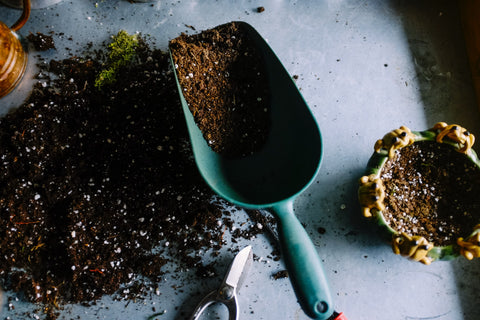5 Things To Keep In Mind When Starting To Live More Sustainably

All of us want to live in a way that doesn't harm the planet. We mean, who wouldn't? Of course, the changes made by the government or corporates have a considerably larger impact, but that doesn't mean that we as consumers, we as citizens, we as human beings have no role to play.
Every single one of our actions leaves a lasting impact on the planet. We could do hundreds and thousands of things today that would help make this world a little easier to live in for future generations. That's why we are so fond of this new lifestyle: sustainable living. All the ideas on the internet might be a little confusing and you might feel a little lost about what you can do to have the biggest impact. Adopting a sustainable lifestyle takes time and energy, but every little bit helps and the difference that you will make is always worth it. These are 5 things you could do that will make the future of our planet much greener and brighter.

Choose minimalism
One of the most urgent problems we are facing today is how frighteningly quickly we are running out of resources. With the steady rise in population and capitalistic excess, minimalism is the need of the hour. A minimalist lifestyle requires changes, but it doesn't have to be daunting – you can start with baby steps and go from there.
There are no hard-set rules that you need to follow. Start by looking at how you're consuming things. When making purchases, introspect and think about how necessary a commodity is in your life – be it new clothes or your weekly grocery haul, we are attuned to buying more than we need. Just thinking through your purchases can make a huge difference. Slowly but surely, you can be more mindful of what and who you're spending your money on, cut down on your plastic waste, shift your eating habits to more plant-based, eco-friendly alternatives, minimize the waste of food and water, make a habit of buying based on functionality and reusability, and so on. A materialistic lifestyle is not only bad for the environment, but it also takes a mental and financial toll on us that we are too accustomed to. Getting used to a minimalist lifestyle can take time, but in the long run, the benefits far outweigh the sacrifices made.

Join a recycling program for plastic and other waste
Recycling is one of the most crucial things we could do while adopting a sustainable lifestyle. Recycling reduces toxic waste and environmental pollution. The reduction of waste also helps to reduce wastage of precious resources, protect ecosystems and encourage biodiversity, all of which our planet is in desperate need of. It also helps to reduce atmospheric carbon and increase the capacity of carbon sequestration by our forests and soil, therefore slowing down the overall build-up of greenhouse gasses and in turn, global warming.There are steps you can take to recycle your waste. If you live in or near an urban area, chances are there are waste management services that you can sign up for. Do some research and find the ones most convenient for you. At home, start by segregating your wet and dry wastes to retain the recyclability of both types of waste. Get creative and reuse or upcycle some items instead of tossing them into the bin, and of course, always try to use reusable and eco-friendly items.

Give composting a go
Composting is just an extension of recycling – it's the process of recycling organic matter that turns them into a fertilizer that is rich in nutrients and beneficial organisms. This decomposed matter is called compost, which can be used for gardening, horticultural and agriculture. The best part is that it's super easy to do and very good for the environment. Composting helps reduce organic waste from our homes and cuts the emission of toxic methane and carbon dioxide from landfills.
While there are compost processing facilities out there, municipalities in India compost a mere 0.21% of our wet waste, and the rest of it ends up in landfills. Instead of letting them go to waste and pollute the environment, find ways to compost at home. There are composting kits available to make the process easier for you, or you can look up DIY guides online. Usable compost takes time to form, but it's very rewarding once what farmers call "black gold" is in your hands. With some effort, you can make composting second nature in no time.

Make changes to your eating habits
Our eating habits are front and center to living more sustainably. Environmentally responsible eating habits don't have to be huge, intimidating changes, but studying and gaining an awareness of where our food comes from and what it costs our environment can surely help to put things in perspective. Livestock production, for example, uses one-third of our world's fresh water supply. It's easy to see how our eating habits can impact the environment.
Fortunately, sustainable eating habits are mostly very healthy for you. Favoring a plant-based diet and reducing your meat consumption as much as you can is a good place to start. Research what nutrients your body needs and you'll find plenty of vegetarian options that are plentiful in those resources. If you prefer a pescatarian diet, look into species that aren't being overfished. If you have space in your home, starting your little garden can be a very gratifying experience. Most importantly, avoid buying food wastefully and be aware of your needs. Buy locally, organically grown and preferably seasonal foods that have a minimal carbon footprint.

Talk about it
You're making changes in your lifestyle, incorporating as many sustainable habits as you possibly can, but it doesn't always feel like you're doing enough, does it? When our daily news cycles are brimming with news about devastating floods, catastrophic forest fires, ominous warnings about rising water levels and irreversible environmental damage, things can often feel hopeless. It is hard to remind yourself that the things you do make a difference, alongside advocating for institutional changes by voting for the right people and raising your voice against injustices. Things can be even more frustrating when it feels like people around you don't care, but it is often the case that it's a simple lack of awareness due to social circumstances and unequal accessibility, and having meaningful conversations can turn the tide on more occasions than you'd expect.
Talking to your loved ones, friends, family, colleagues and classmates, and frankly, anyone who would listen is a worthwhile endeavor. Tell them about the changes you're undertaking, and how they can do it, too. Be compassionate and accommodating of their needs, but gentle and frequent suggestions about things that they can choose to do might turn into concrete action. If you see your acquaintances make little changes, be sure to say something encouraging to motivate them and don't forget to give yourself a pat on the back, either!

